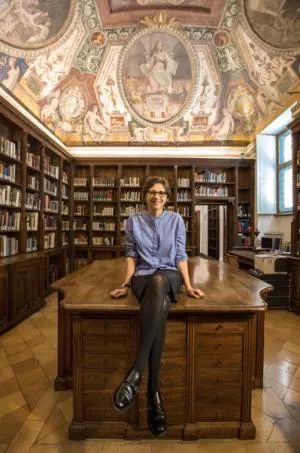
Roman Report
Far from her regular digs on the third floor of the CCT Building at UTM, Evonne Levy, a professor of Renaissance and baroque art and architecture, is spending this 2017-18 academic year in Rome: she is serving as the Wittkower Guest Professor at the Bibliotheca Hertziana, a Max Plank Institute located in the 16th-century palace of the painter Federico Zuccari.
The invited professorship is named for Rudolf Wittkower, a German scholar whose work focused on baroque art, especially the work of sculptor and architect Gian Lorenzo Bernini, one of Levy’s areas of expertise.
“I have had some side projects while in Rome, including an essay on Bernini scholarship for an exhibition that was mounted by the Villa Borghese this year, and also an exciting new project on Bernini that was jumpstarted by the same exhibition – a collaboration with conservators at the Art Gallery of Ontario [AGO] and the Getty Museum on the bronze Crucifix by Bernini in the AGO’s collection,” says Levy.
She has also started working on a new project that focuses on the “intermedial condition of early modern art,” a broad rethinking of painters, sculptors, architects and printmakers, from approximately 1400-1700 in Europe and colonial Latin America. This endeavour has already spawned two events that Levy co-organized with Fabio Barry: a conference at Stanford University in March 2018 and a follow-up workshop sponsored by the Bibliotheca Hertziana in May.
However, the main focus for this past year and her Wittkower professorship was the Wölfflin Project, which is tied to Levy’s Social Sciences and Humanities Research Council-funded project awarded in 2013 to study the global reception of Heinrich Wölfflin's 1915 book, The Principles of Art History.
Wölfflin’s Principles was a seminal text for art historians, and Levy can vividly recall her first encounter with this work as an undergraduate student at Brown University.
“I read it and was asked to write an essay applying the book’s concepts to works of art in the museum of the Rhode Island School of Design,” says Levy. While the formalism her professors were so enthusiastic about in the 1980s is far from her own method today, she still wants her students to learn something from Wölfflin.
Levy’s interest in Wölfflin has also led to much more beyond the students in her courses: in the past fifteen years she has turned her attention to the Germanophone historiography of art at the intersection of politics, including the work of Wölfflin.
Recognizing the Principles’ enduring relevance for art historians, coupled with the coming centenary of the book’s publication and need for a modern English translation, Levy spearheaded a project with collaborator Professor Tristan Weddigen from the University of Zurich to retranslate the 100-year-old text.
“At a certain point an out-of-date translation stands in the way of appreciating the oversize place the book occupies in intellectual history and in the history of the discipline of art history, particularly with the historiographic turn that has been going on in art history in the last decade,” says Levy.
“The translation, which was published by the Getty, the premier venue for art history in translation, is getting quite a bit of notice and appears to be encouraging other translation and re-translation projects, as well as further work on the reception of Wölfflin’s book worldwide.”
In addition to the translation and the book’s first critical edition, her efforts to track the global reception of the Principles have resulted in several significant outputs, including four international conferences in Zurich, Tokyo and the U.S., an hour-long, student-made documentary (“Reading Wölfflin: Toronto Stories”), publications, a project website and a global webinar. All of this has helped to reenergize and reignite debate around Wölfflin’s work, confirming the timeliness of the new translation.
Check out the website The Wölfflin Project for further details on the book, the project, the various editions and the collaborating scholars and institutions.
In 2017, Levy was featured on VIEW to the U, the UTM Research Office’s podcast, where she talks more extensively about her research.
